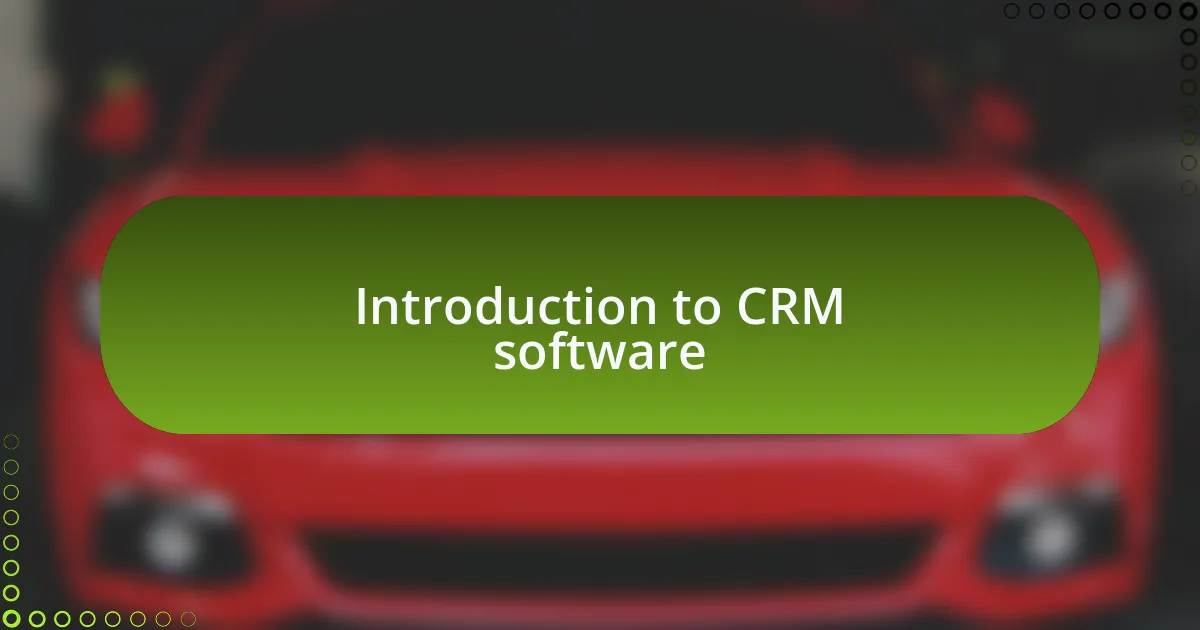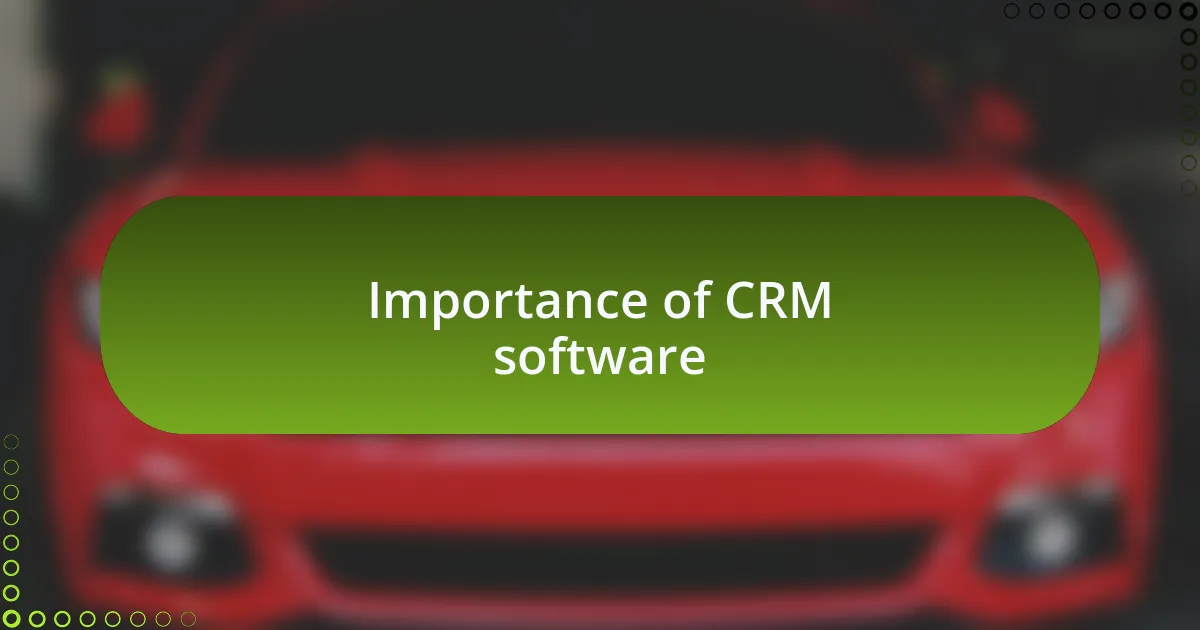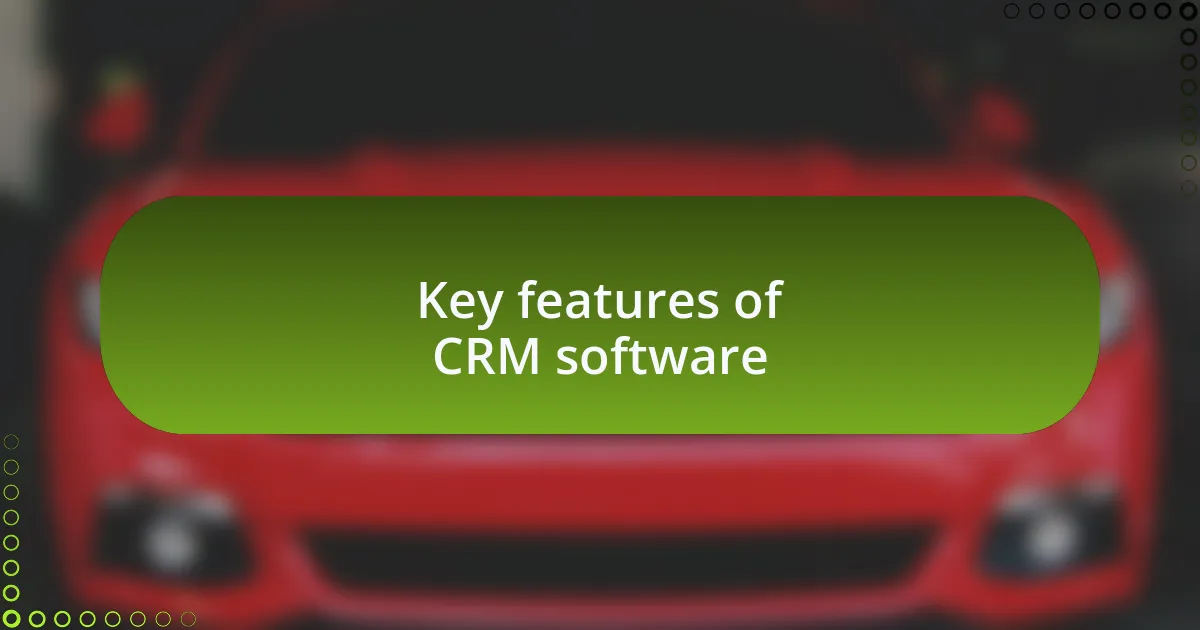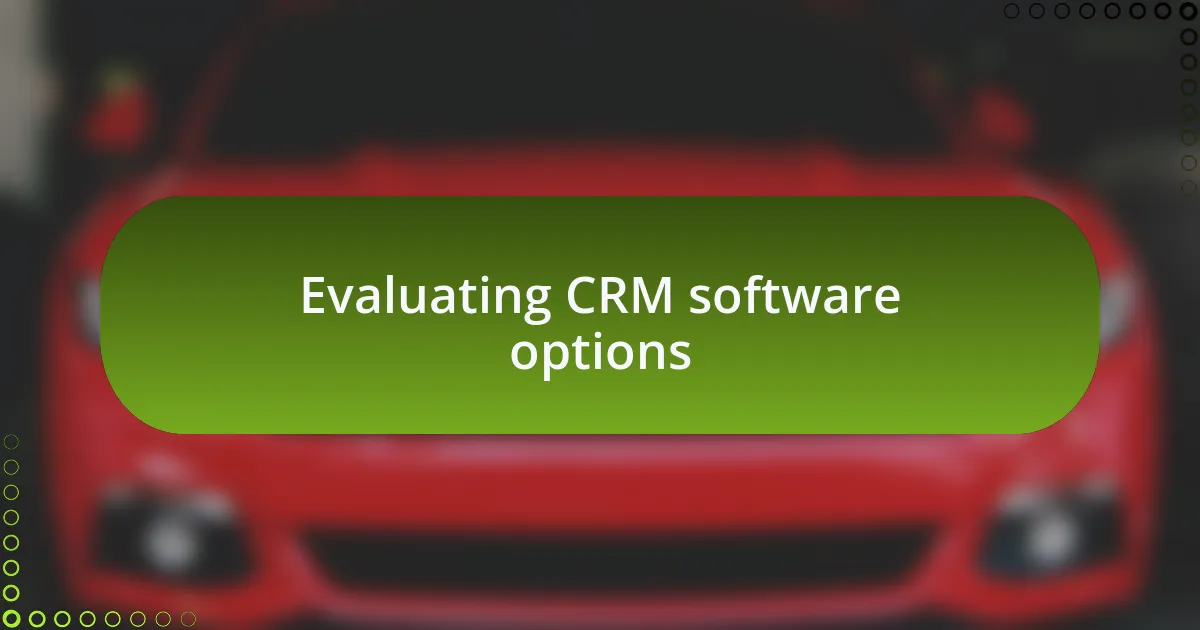Key takeaways:
- CRM software enhances customer understanding and engagement by providing valuable insights and facilitating personalized communication.
- Key features to consider include automation capabilities, robust reporting, and integration with existing tools to improve workflow efficiency.
- Choosing the right CRM involves prioritizing user experience, customization options, and reliable customer support to ensure long-term satisfaction and effectiveness.
- The selection process should involve collaboration with the team to ensure the chosen CRM aligns with their needs and supports future growth.

Introduction to CRM software
Customer Relationship Management (CRM) software is an essential tool for businesses looking to streamline their interactions with clients. I remember when I first encountered CRM platforms; the idea of having a centralized system to manage customer data seemed almost revolutionary. How could such a tool transform my approach to customer relationships?
At its core, CRM software enables organizations to organize customer information, track interactions, and enhance communication. Initially, I found it overwhelming to choose the right one, with so many options available. It made me reflect on what truly mattered in my customer relationships: understanding their needs and preferences.
As I delved deeper into CRM systems, I realized that they offer not just data management, but also insights into customer behavior. I once had a client whose feedback prompted me to customize services more effectively, thanks to the analytics provided by my CRM. This experience reinforced why investing in the right software is crucial; it goes beyond efficiency—it fosters genuine connections with our clients.

Importance of CRM software
CRM software plays a pivotal role in enhancing customer understanding and engagement. I vividly remember the first time I used a CRM to analyze customer feedback. The insights were eye-opening; patterns emerged that I had never noticed before. It made me wonder, how often do we overlook the wealth of information our customers provide?
Moreover, effective CRM solutions facilitate personalized communication, which is invaluable in today’s market. I experienced a dramatic shift in client responses once I began tailoring my messages based on their previous interactions. Imagine how impactful it would be if every business could connect with their customers on such a personal level—wouldn’t that build stronger loyalties?
Additionally, CRM software helps in tracking sales and marketing efforts, allowing for data-driven decisions. When I first analyzed my sales pipeline through my CRM, I could clearly identify which strategies worked best. It raised a question in my mind: without these tools, how could I navigate the complexities of customer relationships effectively? This capability has significantly influenced my approach, reinforcing the notion that the right CRM isn’t just a tool; it’s the backbone of a successful business strategy.

Key features of CRM software
When evaluating CRM software, one key feature to look for is automation capabilities. I remember the relief I felt when I discovered how automation streamlined mundane tasks like follow-up emails and appointment scheduling. This not only saved me time but also allowed me to focus on building meaningful relationships with clients. Could there be a more efficient way to manage customer interactions than through automation?
Another essential feature is robust reporting and analytics. I once worked with a CRM that provided real-time reports, which transformed how I viewed my business performance. Suddenly, I had access to trends and insights that informed my marketing strategies. It made me realize how crucial it is to have data at your fingertips—how else can we adapt and grow in such a fast-paced environment?
Lastly, consider the integration capabilities of the CRM software. In my experience, being able to connect the CRM with other tools I used, like email marketing platforms and project management software, created a seamless workflow. It begged the question: why rely on disjointed systems when a single, integrated solution can enhance efficiency and productivity? The synergy from such integrations ultimately led to a more cohesive and responsive business approach.

Evaluating CRM software options
When diving into the world of CRM options, I found it essential to prioritize user experience. During my evaluation, I encountered a CRM with a cluttered interface, which felt overwhelming instead of intuitive. It made me think: if the tool is challenging to navigate, how can it encourage my team to fully embrace it? Ultimately, ease of use becomes a gateway to adoption and efficiency.
Another critical point is customization. I remember testing out a CRM that offered limited flexibility in tailoring features to meet my specific needs. It struck me as disappointing because every business operates differently, and a one-size-fits-all approach can hinder growth. Having the ability to customize not only enhances user experience but also positions the software as a true partner in business development.
Finally, don’t underestimate the importance of customer support. I once faced a critical issue with a CRM provider whose support team was slow to respond. That experience left me frustrated, reminding me of how vital responsive customer service is—especially when you’re navigating complex software. Wouldn’t it be reassuring to know that help is just a call or chat away when you’re trying to optimize your CRM?

Personal experiences with CRM selection
Selecting the right CRM software was a journey filled with anticipation and a fair amount of anxiety. I vividly recall my first demonstration with a highly recommended platform. Initially, I was excited, but that enthusiasm quickly turned to concern as I realized it lacked key functionalities my team relied on. Could I really invest in something that might limit us rather than enhance our workflow?
One experience that stands out is when I engaged with a vendor’s sales representative. I appreciated their enthusiasm, but as I delved into the discussions, I noticed they brushed over questions about scalability. I remember feeling a twinge of doubt—was this a sign that the CRM wouldn’t evolve as my business grew? This interaction solidified my resolve to dig deeper into scalability features, ensuring I selected a platform that would not just meet our current needs but also support future ambitions.
I also faced a moment of clarity during a trial period with a particularly popular CRM. While exploring the software, I decided to gather feedback from my team. Their hesitations about the user interface mirrored my initial experience, emphasizing that a tool isn’t truly effective if it doesn’t resonate with its users. That realization reinforced my belief in collaborative decision-making—after all, the best choice is one that everyone is excited about and can utilize seamlessly.

Factors influencing my CRM choice
Choosing the right CRM software was influenced by several factors that shaped my decision-making process. One critical aspect was integration with our existing tools. When I considered a CRM that didn’t effectively mesh with our current photo editing platform, I could almost feel the frustration building up in my gut. Would I really want to add another layer of chaos to my team’s workflow?
Cost also played a significant role in my evaluation. I recall analyzing various pricing models and wondering if the features justified the expense. It was a fine balance between investing in quality and staying within budget. Reflecting on my past experiences, I knew that underestimating costs could lead to added pressure down the line—could our small business absorb those financial shocks?
Another influence was the vendor’s customer support. During my searches, I found myself paying close attention to reviews that highlighted the responsiveness of support teams. I distinctly remember discovering a CRM with glowing recommendations for its user assistance, and I thought, “Wouldn’t it be a relief to have a dependable partner to guide us?” That confidence in support made me lean toward solutions that would not leave my team stranded with unanswered questions.

Final thoughts on CRM selection
Selecting the right CRM software often feels like navigating a maze, filled with decisions that can make or break a business. There were moments when I questioned whether I was overthinking my choices, but evaluating how each option aligned with our team dynamics proved crucial. When I finally settled on a CRM that fostered collaboration rather than complicating it, I felt a weight lift; it was as if the stars had aligned for our workflow.
I also found myself reflecting on the long-term relationship I’d be building with the software. It was fascinating—and a little intimidating—to think this tool would be part of our daily operations for years to come. Wouldn’t it be wise to choose one that adapts as we grow? In the end, I was drawn to a CRM that not only met our current needs but also had a roadmap for future enhancements—an investment in our vision.
Ultimately, the choice of a CRM boils down to how it resonates with your team’s values and goals. I remember the relief when I realized that the right software didn’t just tick boxes; it truly understood our mission. In a world where every decision counts, I can confidently say that selecting a CRM is about finding a partner that amplifies your strengths rather than just serving as a digital tool.